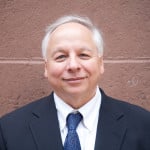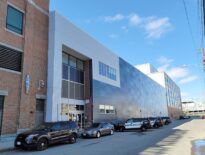
Rick Dimino
Meeting climate emission goals will require significant innovation in the commercial real estate sector for both building systems and the people who manage them. The office towers, large residential buildings and institutions of Greater Boston are already major employment centers and now they can be central to providing equitable workforce development opportunities in the green economy.
Earlier this month the City of Boston’s PowerCorpsBOS, Roxbury Community College and A Better City announced a new workforce training partnership that is focused on a pilot cohort – building operations – within the PowerCorpsBOS program.
Students will train one day a week with the PowerCorpsBOS team learning workforce fundamentals and two days per week in Roxbury Community College’s Center for Smart Building Technology where they will learn to conduct energy audits, maintain electrical, HVAC and plumbing systems and help buildings to operate at peak efficiency.
They will spend the additional two days each week in real-world training within large buildings, including those owned or operated by A Better City members Beacon Capital Partners, Brigham and Women’s Hospital, Dana-Farber Cancer Institute, the Federal Reserve Bank of Boston, Mass General and JLL, with the goal of transitioning into full-time employment after the six-month program.
Opportunity and Skills-Building
This public-private-partnerships can build a greener city demonstrating the private sector’s commitment to enhancing our city’s economic health and competitiveness. The new program, made possible by grants from the Linde Family Foundation and Barr Foundation, can produce the next generation of leaders in a growing industry. Over six years ago, member organizations of A Better City raised awareness about the need for a new or retrained workforce that could keep up with increasingly smart, high-performance and high-tech buildings systems. But this program will produce more than just workers with technical skills. It is designed to reach historically marginalized youth and open doors into new employment opportunities including within large buildings, many of which are foundational to the Greater Boston economy.
This program will not only help to diversify the building operations industry, but it can create economic self-sufficiency for youth who have experienced unemployment, underemployment, homelessness or housing instability. It is no exaggeration that this type of program can truly transform people’s lives, and it is taking place at a time when our economy needs skilled workers to assist with current and future climate challenges.
This is a new and proud chapter for the city of Boston and Mayor Michele Wu’s PowerCorpsBOS program. Last year, the mayor’s initiative started with a six-month program to train students in urban forestry. The focus on building operations will now address a critical void in both the workforce talent pipeline and building emissions reductions.
Addresses Major Climate Hurdle
Today, 70 percent of Boston’s greenhouse gas emissions are produced by the building sector and the pathway to net zero emission goals will not be easy. Many existing commercial and industrial buildings in Boston will be very difficult to decarbonize, partly because of current costs, partly because of limits in current technologies and partly because of the lack of a skilled workforce to operate them. This training program is a great start, and one that can be expanded on in future years as the green economy continues to evolve.
On the technology side, a model program in New York called the Empire Building Challenge is incentivizing large building owners and developers to conduct deep energy retrofits in existing buildings. The aim is to help achieve deep emissions reductions across a range of building typologies. Massachusetts should create its own Commonwealth Building Challenge, specific to our climate zone.
We can also build on the Mass Clean Energy Center’s recent interest in providing financial support for building decarbonization plans. The potential of a “climate bank” capitalized through federal grant funding is also an opportunity for financial support. Any such program, however, must include the Department of Public Utilities and ISO-New England to address the capacity, transmission, distribution and interconnection challenges of our current and future electric grid.
As technology improves and investments in decarbonized systems evolve, we will still need a highly skilled workforce to deliver on these climate-related goals. This first year of a building operations program within PowercorpsBOS can become a great success story to expand to additional locations in Boston and throughout the region. A Better City and our member organizations are committed to making this partnership work, because the impacts on youth, buildings, climate and communities will be worth it.
Rick Dimino is CEO of A Better City.





